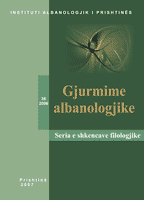ELEMENTE TË NJË GRAMATIKE NË FJALORIN E FRANG BARDHIT
THE ELEMENTS OF A GRAMMAR IN THE FRANG BARDHI’S DICTIONARY
Author(s): Ragip MulakuSubject(s): Language and Literature Studies
Published by: Instituti Albanologjik i Prishtinës
Keywords: ELEMENTS OF A GRAMMAR ; FRANG BARDHI’S DICTIONARY
Summary/Abstract: In this study, as comprehended by its title, there are discussed grammatical elements in the Latin-Albanian Dictionary by Frang Bar-dhi, which in fact represent beginnings and nucleus (seed) of a grammar of Albanian language. These linguistic data (clues) of a work relatively old (XVII century), pointed out here, are considered to be the first efforts which reflect main elements or starting – point for compilation of an Albanian grammar. It is mentioned that in his Dictionary Bardhi has not divided words in parts of speech, i. e. in lexical – grammatical categories, and this could not be expected to be done in the first work of Albanian lexicography, however it is pointed out that some chapters that Bardhi added to the Dictionary in the last part, we could undoubtedly conclude that they make prior elements of an Albanian grammar, and as such, they could have been of use as the foundation for the first Grammar by Mario Da Leçe (1716) and for the other later grammars of Albanian. These chapters of the Frang Bardhi’s Dictionary, which contain lexical – grammatical categories, like numerals (cardinal and ordinal so-called Të Njefunatë p. 189-194), masculine nouns, feminine nouns, adverbs (all types), prepo-sitions (front and derived) are the topics of discussion of this study. As far as the forms of ordinal numerals are concerned, the author has specified forms of numerals over ten: (I njambëdhjeti=eleventh, I dyyti mbëdhjetë = twelfth, I treti mbëdhjetë=thirteenth, I katër-ti mbëdhjetë=fourteenth, I pesti mbëdhjetë=fifteenth, I gjashti mbëdhje-të=sixteenth, I shtati mbëdhjetë=seventeenth, I teti mbëdhjetë=eigh-teenth, and I nandi mbëdhjetë=nineteenth), among which has put front preposition –ti, noticed by Bardhi at the end of of the first compound word: I dyy-ti mbëdhjetë, I tre-ti mbëdhjetë, and further on, which according to the nature of Albanian we would expect it at the end of the second compound word of the numeral, i dymbëdhjeti, i trembë-dhjeti, i katrëmbëdhjeti, through dissimilation from i dymbëdhjettë-i, i trembëdhjettë-i, i katërmbëdhjettë-i, and not be kept like in ordinal front numerals: i dy-ti, i tre-ti, i katër-ti, i pes-ti etc. These forms of ordinal numerals have come out; it seems, under the influence of the respective forms in Latin.
Journal: Gjurmime Albanologjike - Seria e shkencave filologjike
- Issue Year: 2006
- Issue No: 36
- Page Range: 077-084
- Page Count: 8
- Language: Albanian
- Content File-PDF

